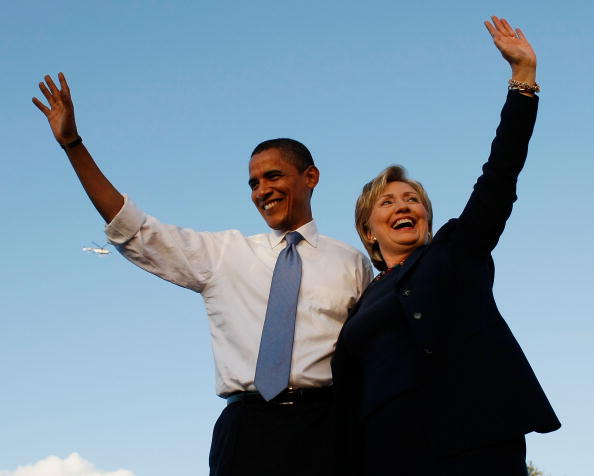2007 Obama campaign memo detailing how to defeat Hillary Clinton surfaces


A free daily email with the biggest news stories of the day – and the best features from TheWeek.com
You are now subscribed
Your newsletter sign-up was successful
As the summer of 2007 turned into fall, presidential candidate Barack Obama was trailing in the national polls behind Hillary Clinton, "the pundits were pouncing, and donors were panicking," David Axelrod, his top strategist at the time, told Ryan Lizza of The New Yorker.
With a Philadelphia debate and the Iowa Democratic Party's Jefferson-Jackson Dinner ahead, the Obama team decided in October the frontrunner's main vulnerability was her character, and Axelrod — along with campaign manager David Plouffe, pollster Joel Benenson, deputy communication director Dan Pfeiffer, and strategist Larry Grisolano — put together a memo that Axelrod said was "written for a big Come-to-Jesus meeting, at which Obama wanted us to review the strategy and lay out our plans."
The memo, which Lizza published for the first time in its entirety on Tuesday, states that polling at the time showed voters were looking for a president who "can unite the country and restore our sense of common purpose," and the campaign team agreed that "Barack Obama is change. She is not." Obama's slogan, "Change you can believe in," was a contrast to Clinton not on policy, but on character, the strategists wrote, adding, "We cannot let Clinton especially blur the lines on who is the genuine agent of change in this election." They put together a compare and contrast list, with messages that needed to be emphasized by Obama — Obama they wrote, was "tough on issues and doesn't just tell people what they want to hear; he tells them what they need to know," while Clinton was "driven by politics, not conviction. From the war, to NAFTA, to Social Security, her choice of baseball teams, Clinton is constantly shifting, dodging, and changing positions to satisfy the politics of the moment."
The Week
Escape your echo chamber. Get the facts behind the news, plus analysis from multiple perspectives.

Sign up for The Week's Free Newsletters
From our morning news briefing to a weekly Good News Newsletter, get the best of The Week delivered directly to your inbox.
From our morning news briefing to a weekly Good News Newsletter, get the best of The Week delivered directly to your inbox.
As Grisolano told Lizza, "Frequently, in campaigns, we say 'contrast,' it's a euphemism for a frontal attack. You can see in the memo, and this is important about the constraints that the message put on us, because if you are the unity guy you can't come out with a crowbar against your opponent. We had to show we were different, but do it in a way that wasn't as direct as most campaigns do." The strategists told Lizza they don't know if the same strategy would work against Clinton today, but she definitely learned something from Obama's team — one of her campaign's first hires was pollster and memo writer Joel Benenson.
A free daily email with the biggest news stories of the day – and the best features from TheWeek.com
Catherine Garcia has worked as a senior writer at The Week since 2014. Her writing and reporting have appeared in Entertainment Weekly, The New York Times, Wirecutter, NBC News and "The Book of Jezebel," among others. She's a graduate of the University of Redlands and the Columbia University Graduate School of Journalism.
-
 Health insurance: Premiums soar as ACA subsidies end
Health insurance: Premiums soar as ACA subsidies endFeature 1.4 million people have dropped coverage
-
 Anthropic: AI triggers the ‘SaaSpocalypse’
Anthropic: AI triggers the ‘SaaSpocalypse’Feature A grim reaper for software services?
-
 NIH director Bhattacharya tapped as acting CDC head
NIH director Bhattacharya tapped as acting CDC headSpeed Read Jay Bhattacharya, a critic of the CDC’s Covid-19 response, will now lead the Centers for Disease Control and Prevention
-
 NIH director Bhattacharya tapped as acting CDC head
NIH director Bhattacharya tapped as acting CDC headSpeed Read Jay Bhattacharya, a critic of the CDC’s Covid-19 response, will now lead the Centers for Disease Control and Prevention
-
 Witkoff and Kushner tackle Ukraine, Iran in Geneva
Witkoff and Kushner tackle Ukraine, Iran in GenevaSpeed Read Steve Witkoff and Jared Kushner held negotiations aimed at securing a nuclear deal with Iran and an end to Russia’s war in Ukraine
-
 Pentagon spokesperson forced out as DHS’s resigns
Pentagon spokesperson forced out as DHS’s resignsSpeed Read Senior military adviser Col. David Butler was fired by Pete Hegseth and Homeland Security spokesperson Tricia McLaughlin is resigning
-
 Judge orders Washington slavery exhibit restored
Judge orders Washington slavery exhibit restoredSpeed Read The Trump administration took down displays about slavery at the President’s House Site in Philadelphia
-
 Hyatt chair joins growing list of Epstein files losers
Hyatt chair joins growing list of Epstein files losersSpeed Read Thomas Pritzker stepped down as executive chair of the Hyatt Hotels Corporation over his ties with Jeffrey Epstein and Ghislaine Maxwell
-
 Judge blocks Hegseth from punishing Kelly over video
Judge blocks Hegseth from punishing Kelly over videoSpeed Read Defense Secretary Pete Hegseth pushed for the senator to be demoted over a video in which he reminds military officials they should refuse illegal orders
-
 Trump’s EPA kills legal basis for federal climate policy
Trump’s EPA kills legal basis for federal climate policySpeed Read The government’s authority to regulate several planet-warming pollutants has been repealed
-
 House votes to end Trump’s Canada tariffs
House votes to end Trump’s Canada tariffsSpeed Read Six Republicans joined with Democrats to repeal the president’s tariffs
